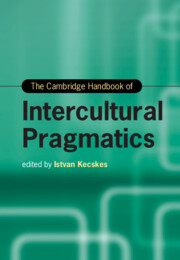Book contents
- The Cambridge Handbook of Intercultural Pragmatics
- Cambridge Handbooks in Language and Linguistics
- The Cambridge Handbook of Intercultural Pragmatics
- Copyright page
- Contents
- Figures
- Tables
- Acknowledgment
- Contributors
- Introduction The Rise of Intercultural Pragmatics
- Part I Theoretical Foundation
- Part II Key Issues in Intercultural Pragmatics Research
- Part III Interface of Intercultural Pragmatics and Related Disciplines
- Part IV Intercultural Pragmatics in Different Types of Communication
- Part V Language Learning
- Index
- References
Introduction - The Rise of Intercultural Pragmatics
Published online by Cambridge University Press: 29 September 2022
- The Cambridge Handbook of Intercultural Pragmatics
- Cambridge Handbooks in Language and Linguistics
- The Cambridge Handbook of Intercultural Pragmatics
- Copyright page
- Contents
- Figures
- Tables
- Acknowledgment
- Contributors
- Introduction The Rise of Intercultural Pragmatics
- Part I Theoretical Foundation
- Part II Key Issues in Intercultural Pragmatics Research
- Part III Interface of Intercultural Pragmatics and Related Disciplines
- Part IV Intercultural Pragmatics in Different Types of Communication
- Part V Language Learning
- Index
- References
Summary
Intercultural pragmatics is a relatively new field of inquiry that is concerned with the way in which the language system is put to use in social encounters between human beings who have different first languages but communicate in a common language, and, usually, represent different cultures (see Kecskes 2004, 2013). The main focus of research in this field is on intercultural interactions. In these encounters, the communicative process is synergistic, in the sense that existing pragmatic norms and emerging co-constructed features are present to a varying degree. The innovative feature of the field is that it provides an alternative way of thinking about interaction by shifting the attention of researchers from first language (L1) communication to intercultural communication. In Gricean pragmatics everything is about native speakers (mainly native speakers of English) of a language who are members of the same, although diverse and relatively definable, speech community, who have preferred ways of saying things and preferred ways of organizing thoughts, who share core common ground, conventions, norms, and distributed collective salience. This gives them a relatively firm basis for understanding each other.
- Type
- Chapter
- Information
- Publisher: Cambridge University PressPrint publication year: 2022



